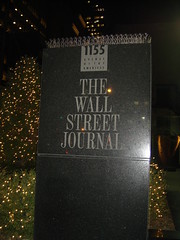 Image via CrunchBaseQuotes From Around The Web
Image via CrunchBaseQuotes From Around The Web
Tokyo’s Nikkei 225 stock average advanced 235.27 points, or 2.78 percent, at 8,693.82. The index was still far from recouping Thursday’s 11.4 percent loss – its biggest one-day percentage drop since the stock market crash of October 1987.
For the week, the Nikkei gained 5 percent, much better than the 24 percent it lost last week.
Compared to the gyrations earlier this week, Asian markets were moderately more stable.
Shanghai’s index rose for the first time in a week. But Hong Kong’s Hang Seng index dropped over 4 percent to 14,554.21, its lowest level in almost three years as selling accelerated late in the day after banks said they would help investors in Lehman Brothers (nyse: LEH – news – people )-backed bonds recouped some of their money. Australia, Singapore and South Korea also closed lower.
European stocks fared better in early trading as Britain, German and French indices gained more than 2 percent. Russian stocks lost ground.
Friday’s mixed session closed out an extremely volatile week that began with a two-day rally. Then, on Thursday, global stock markets plunged as weaker-than-expected U.S. retail sales data and a downbeat assessment from the U.S. Federal Reserve showed the world’s largest economy, so critical to Asia’s export countries, was heading into a recession.
In Hong Kong, the Hang Seng Index lost 4.4% to 14554.21 on concerns the global financial turmoil and slowing U.S. and European economies will hit Asia hard.
Castor Pang, a strategist with Sun Hung Kai Financial, said he expects the index to head toward 14000 points next week, as Asian investors become more aware of their countries’ deteriorating economic conditions. “Economic woes in Korea are hurting investors’ sentiment around the region,” he said. “With no resolution in sight, I believe the market will stay gloomy.”
Australian stocks see-sawed through a shaky day of trading to close marginally lower. The S&P/ASX 200 Index closed down 1.1% at 3970.8, despite jumping 3% in early trading.
Traders said the failure to track the Wall Street gain was disappointing. “What was in the U.S. rally?” asked a senior trader at a major brokerage. “Industrial production (data in the U.S.) was a disaster. That has hellishly big ramifications for our resource sector and we’ve seen our resource stocks get thrashed.”
Resource stocks reversed early gains on worries about weakening global demand for commodities, with Rio Tinto dropping 3.8% and BHP Billiton shedding 3.4%.
November crude-oil prices advanced as much as $3.03 to $72.88 a barrel in electronic trading, after dropping $4.69 to end at $69.85 a barrel in New York Thursday. December gold futures rose $5.10 to $809.60 an ounce, after losing $34.50 to $804.50 an ounce.
South Korean stocks gave up early gains to end lower, with banks and construction companies leading losses on fears of a further slowdown in the local property market and concerns over the health of local banks. The benchmark Kospi index, which lost as much as 9.4% Thursday, fell 2.7% to 1180.67 — its lowest close since October 2005.
GS Engineering & Construction, Daelim Industrial, Hanwha Chemical and Hanwha Corp. all sank by the daily 15% limit.
Local banks extended Thursday’s losses on concerns over their foreign-currency funding, which led S&P recently to place seven local banks on watch for a possible ratings downgrade. Shinhan Financial Group lost 8.8%, KB Financial slid 12% and Hana Financial Holdings plunged by the daily 15% limit.
Stocks in Europe were higher. The FTSE 100 index rose 3.3%, while the DAX in Frankfurt rose 1.6%.
U.S. stock futures were indicating a lower open for stocks on Wall Street. Futures on the S&P 500 fell 13.80 points to 927.20, and were trading 20.95 points below fair value. Nasdaq futures were down 26 points to 1297, and were 23.13 points below fair value.
U.S. stocks finished a wobbly Thursday to the upside. The day was marked by a flood of corporate earnings statements, evidence of additional turmoil in the financial sector and a fresh serving of economic data.
I am Jon, and those are some of the voices in my head this morning.




